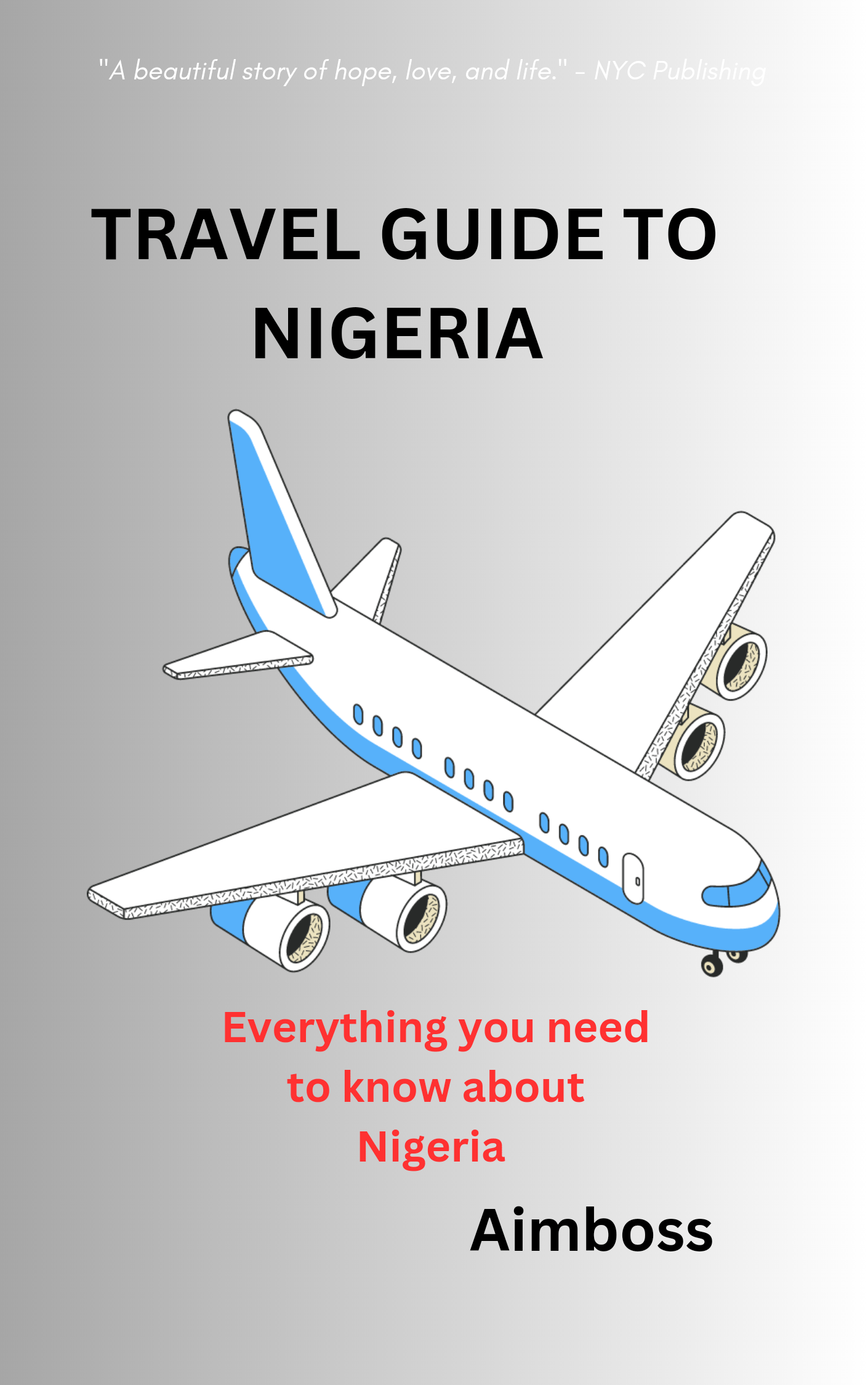Nigeria, located in West Africa, is known for its diverse political landscape, rich resources, and varied challenges. The political system is a federal republic with a history of both military and civilian rule. The nation faces issues such as corruption and ethnic tensions, impacting political stability.
Nigeria is endowed with abundant natural resources, including oil, which significantly influences its economy. However, over-reliance on oil makes the country vulnerable to global price fluctuations, affecting economic stability. Efforts to diversify the economy and promote sectors like agriculture are ongoing.
Nigeria Travel guide book click on this link https://www.amazon.com/dp/B0CRJ2R77T?binding=kindle_edition&searchxofy=true&ref_=dbs_s_aps_series_rwt_tkin&qid=1711173082&sr=8-4
Infrastructure development in Nigeria has been a priority, but challenges persist, especially in power supply, transportation, and healthcare. Investments are being made to improve these areas, aiming to enhance overall quality of life and economic activities.
The Nigerian education system faces challenges such as inadequate funding and uneven access. Despite efforts to improve literacy rates and expand educational opportunities, disparities exist between urban and rural areas, impacting the overall educational landscape.
In summary, Nigeria grapples with political complexities, resource dependence, infrastructure gaps, economic diversification endeavours, and educational disparities as it strives for sustainable development.
Nigeria has four refineries: Port Harcourt Refining Company (PHRC), Warri Refining and Petrochemical Company (WRPC), and two refineries in Kaduna. However, the operational status of these refineries has been a challenge. They often experience maintenance issues, disruptions, and inefficiencies, leading to periods of downtime.
It’s recommended to check the latest information from reliable sources or news updates for the current status of Nigeria’s refineries, as operational statuses can change due to maintenance, upgrades, or other factors
What are the major problems Nigeria is currently facing?
Security Concerns: Nigeria grapples with various security issues, including terrorism (Boko Haram insurgency in the northeast), communal conflicts, and banditry. These challenges have implications for the safety and well-being of citizens.
Economic Diversification: The country is heavily reliant on oil exports, making its economy vulnerable to global oil price fluctuations. Efforts to diversify the economy and reduce dependence on oil face obstacles.
Corruption: Corruption remains a pervasive issue in Nigeria, impacting various sectors and hindering efficient governance. Addressing corruption is crucial for sustainable development.
Infrastructure Deficits: The country faces significant gaps in infrastructure, particularly in areas such as power supply, transportation, and healthcare. This hampers economic growth and overall quality of life.
Unemployment: High levels of unemployment, particularly among the youth, pose a challenge. Addressing this issue requires strategic economic planning and job creation initiatives.
Ethnic and Religious Tensions: Nigeria is characterized by diverse ethnic and religious groups, leading to occasional tensions. Managing diversity and promoting national unity is an ongoing challenge.
Educational Disparities: Disparities exist in access to quality education, particularly between urban and rural areas. Improving the education system is essential for long-term development.
It’s important to note that the situation may have evolved since my last update, and checking the latest news or reports is advisable for the most current information on the challenges facing Nigeria.
Corruption has been a longstanding challenge in Nigeria. Transparency International’s Corruption Perceptions Index consistently ranked Nigeria as a country facing significant corruption issues. As of my last knowledge update in January 2022, Nigeria’s corruption levels were a concern, with efforts being made to address the issue through reforms, anti-corruption agencies, and legislative measures.
The extent of corruption can vary across different sectors and regions within the country. The government has implemented initiatives to combat corruption, but progress has been mixed. It’s advisable to check more recent sources or reports for the latest assessments of Nigeria’s corruption situation, as efforts to combat corruption are dynamic and ongoing.
Nigeria gained independence from British colonial rule on October 1, 1960. Therefore, as of 2024, Nigeria would be 64 years old as an independent nation.
Regarding past presidents, here is a brief overview of Nigeria’s presidents since its independence:
Nnamdi Azikiwe (1963 – 1966): He became the first President of Nigeria in 1963, following Nigeria’s transition to a republic. His presidency was cut short by a military coup in 1966.
Johnson Aguiyi-Ironsi (1966): He assumed the presidency briefly in 1966 after a military coup but was overthrown later that year.
Yakubu Gowon (1966 – 1975): Gowon took power after the 1966 coup. His leadership saw the Nigerian Civil War (1967-1970) and economic challenges.
Murtala Muhammed (1975 – 1976): Muhammed came to power in a coup and initiated various reforms before being assassinated in 1976.
Olusegun Obasanjo (1976 – 1979): As a military ruler, Obasanjo served as Nigeria’s head of state until the return to civilian rule in 1979.
Shehu Shagari (1979 – 1983): He became Nigeria’s first executive president in 1979, leading the country until a military coup in 1983.
Muhammadu Buhari (1983 – 1985): Buhari took power through a coup in 1983 but was ousted in another coup in 1985.
Ibrahim Babangida (1985 – 1993): Babangida assumed power after the 1985 coup and served as Nigeria’s military president until his resignation in 1993.
Ernest Shonekan (1993): Shonekan briefly served as interim president during a transitional period.
Sani Abacha (1993 – 1998): Abacha seized power and ruled until his death in 1998.
Abdulsalami Abubakar (1998 – 1999): Abubakar took over after Abacha’s death and oversaw the transition to civilian rule in 1999.
Since the return to democracy in 1999, Nigeria has had several civilian presidents, including Olusegun Obasanjo, Umaru Yar’Adua, Goodluck Jonathan, and Muhammadu Buhari, who has been in office since 2015. Please note that there may have been developments since my last update in January 2022.
Nigeria four zones, south,west,north and east with their major challenges
Certainly. Nigeria is divided into four major geopolitical zones: North, South, East, and West. Each zone faces unique challenges.
North
Challenges: The Northern region grapples with issues such as poverty, insurgency (e.g., Boko Haram), and communal conflicts. Limited access to quality education and healthcare also poses significant challenges.
South:
Challenges: The Southern region, while economically vibrant, faces challenges such as environmental degradation, oil pollution, and inadequate infrastructure. Issues like militancy in the Niger Delta have contributed to social and economic tensions.
East:
Challenges: The Eastern region struggles with infrastructure deficits, including roads and power supply. There are also concerns about political representation and resource allocation, contributing to occasional tensions.
West
Challenges: The Western region has made considerable progress, but challenges include urbanization issues, inadequate social amenities, and occasional ethnic tensions. Economic opportunities are often concentrated in specific areas, leading to disparities.
It’s important to note that these challenges are complex and interconnected, requiring a holistic and collaborative approach for effective resolution.
Which region is the safest in Nigera?
Determining the safest region in Nigeria can be subjective and may change over time. Generally, regions with lower levels of crime and conflict are considered safer. As of my last knowledge update in January 2022, some areas in the southwestern region, like Lagos and Ogun states, were often perceived as relatively safer compared to certain regions in the north and south with ongoing security challenges.
However, safety is dynamic and influenced by various factors, including economic stability, political climate, and local initiatives. It’s advisable to check the latest travel advisories, local news, and security reports for the most current information, as situations can evolve.
The perception of political support in Nigeria varies, and opinions on how supportive politicians are to citizens can be diverse. Nigeria has experienced challenges such as corruption, political instability, and governance issues, which have influenced public opinion.
Some citizens believe that politicians are not adequately addressing economic inequalities, unemployment, and basic infrastructure needs. Corruption allegations within the political sphere have also fueled skepticism about the commitment of some politicians to the welfare of citizens.
On the other hand, there are politicians and initiatives aimed at addressing social and economic issues, implementing reforms, and improving governance. Public sentiment can differ based on individual experiences and expectations from political leaders.
It’s important to note that views on political support are subjective and can change based on political developments, policy outcomes, and public engagement.
About Nigeria cultural insight
Explore Nigeria’s vibrant cultural tapestry through its diverse ethnic groups, each contributing unique traditions, languages, and artistic expressions.
Delve into the rich history of kingdoms like the Benin Empire and the Oyo Empire, showcasing the country’s historical significance. Highlight the colourful festivals, such as the Durbar festival in the north or the Osun-Osogbo festival in the southwest, offering glimpses into age-old rituals and celebrations.
Art lovers can discover Nigeria’s contemporary art scene, with globally acclaimed artists like Chinua Achebe and Wole Soyinka. Traditional Nigerian music, from the rhythmic beats of Afrobeat to the soulful sounds of highlife, adds a dynamic soundtrack to daily life. Don’t forget to showcase the warmth and hospitality of the Nigerian people, making visitors feel at home in this culturally rich nation.
How good is Nigeria’s hospitality to new citizens?
Nigeria is known for its warm hospitality, and new citizens often find a welcoming and friendly atmosphere. The people are generally open to embracing newcomers, and there’s a strong sense of community. However, experiences can vary, and factors like location, individual attitudes, and cultural differences may influence one’s perception of hospitality.
Engaging with local communities, being respectful of customs, and showing genuine interest in the culture can enhance the overall positive experience of integrating into Nigerian society.
About fish farming in Nigeria 
Fish farming, or aquaculture, is a thriving industry in Nigeria with significant economic and nutritional benefits. Tilapia and catfish are among the most commonly farmed species. The favourable climate, abundant water resources, and increasing demand for fish contribute to the growth of this sector.
Fish farmers in Nigeria often utilize ponds, cages, or tanks for cultivation. Modern techniques, such as recirculating aquaculture systems, are gaining popularity for their efficiency. Government initiatives and support programs aim to boost the industry, providing training and funding for aspiring fish farmers.
Challenges, including disease outbreaks and infrastructure limitations, exist, but innovations and improved practices continue to address these issues. Fish farming not only supports local food security but also offers income opportunities for farmers, contributing to the overall economic development of Nigeria.
Is a fish farm advisable for newbies?
Yes, fish farming can be a viable and rewarding venture for newcomers. Start with thorough research to understand the basics of agriculture, including suitable fish species, pond management, and feeding practices. Consider beginning on a small scale to gain practical experience before scaling up.
Attending training programs or seeking guidance from experienced fish farmers can provide valuable insights. Government and non-governmental organizations often offer support and resources to new entrants in the industry.
While challenges may arise, careful planning, dedication, and continuous learning can contribute to the success of a fish farming venture. It’s essential to be mindful of factors like water quality, disease prevention, and market dynamics as you embark on this agricultural endeavor.
Does the Nigerian government support individuals who involved in fish farming ?
Yes, the Nigerian government has demonstrated support for individuals involved in fish farming through various initiatives and programs. These initiatives are aimed at boosting food security, increasing income for farmers, and promoting sustainable aquaculture practices. Support mechanisms may include:
Financial Assistance: Government agencies may provide loans or grants to fish farmers for infrastructure development, such as pond construction or purchasing equipment.
Training Programs: The government often organizes training sessions and workshops to educate fish farmers on modern aquaculture techniques, disease management, and sustainable practices.
Research and Development: Investments in research and development help improve the overall efficiency and productivity of the fish farming sector.
Subsidies: Subsidies on inputs like fish feed, fingerlings, and equipment may be provided to reduce the operational costs for fish farmers.
Extension Services: Extension services are often offered to provide farmers with ongoing support, advice, and information to enhance their practices.
While these support systems exist, the effectiveness can vary, and accessing them may require navigating administrative processes. It’s advisable for aspiring fish farmers to stay informed about available government programs and seek assistance from relevant agricultural authorities.

